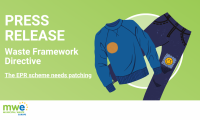The EP adopts its position on the WFD revision for food waste and textiles
Transparent and effective EPR negotiations
Federico Foschini, President of MWE (UTILITALIA, Italy), underscores the importance of transparency and the involvement of public authorities and relevant stakeholders in EPR negotiations: "It is essential that all EPR scheme negotiations are transparent, accurately representing the real costs of collection and treatment, and involving public authorities and relevant stakeholders engaged in the management of textile waste, to make sure the Polluter Pays Principle is applied correctly in the design and execution of separate collection systems. We are confident that the Parliament's decision to include these key actors in the process will foster stronger relationships with producers and lead to a more efficient and successful EPR scheme."
Loopholes to be addressed
Municipalities are pleased to see that the European Parliament has broadened the scope of EPR beyond household waste to include sources such as hospitals, hotels, restaurants, and schools. Producers are required to cover at least 80% of the costs associated with collection, sorting for re-use, preparing for re-use and recycling, and R&D. MWE welcomes the incorporation of the cost of information campaigns including ongoing communication work. However, MWE calls for a more ambitious approach, making sure that producer responsibility fulfils the extension of EPR which is to ensure the polluters pay:
- Waste textiles that remain in the mixed waste stream
- Unsold textiles
- Industrial waste textiles
“It is crucial that the EPR scheme is effectively implemented, encouraging producers to follow the EU’s Strategy for Sustainable and Circular Textiles to create a greener textiles sector. Fast fashion must shift from a linear model to a circular one, making textiles more long-lasting through design requirements, improving the circularity of the sector, reducing waste and building customer trust in the process.”
Reducing the implementation timeframe
By 1 January 2025, municipalities are set to be responsible for organising the separate collection of textile waste. We welcome the European Parliament’s has sped up the implementation time for Member States to have an active EPR in place taking it from 30 months to 18. This will still mean 3.5 years after official publications. MWE is concerned about the economic burden this delay will impose on many municipalities as during this time gap they will need to, or have already invested in the necessary infrastructure.
Municipal Waste Europe represents European public responsibility for municipal waste management. Our members are municipalities and public waste management companies that play a crucial role in providing this Service of General Interest and in delivering a circular economy in Europe. We support the waste hierarchy, resource efficiency and the exchange of good practices to develop environmentally sound and efficient waste management systems in Europe.
Erik Hayes
Communications and Events officer
Contact:
Email: erik.hayes@municipalwasteeurope.eu
Tel: +32 490 26 57 78


